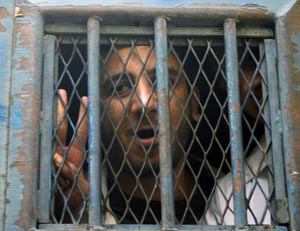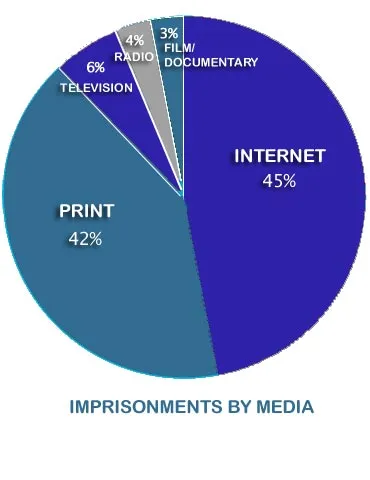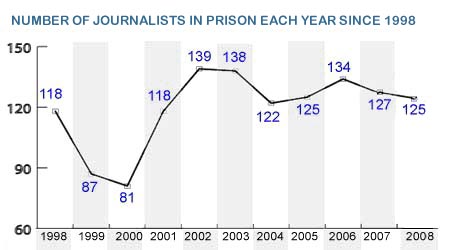Also: See capsule reports on journalists in jail as of December 1, 2008
New York, December 4, 2008–Reflecting the rising influence of online reporting and commentary, more Internet journalists are jailed worldwide today than journalists working in any other medium. In its annual census of imprisoned journalists, released today, the Committee to Protect Journalists found that 45 percent of all media workers jailed worldwide are bloggers, Web-based reporters, or online editors. Online journalists represent the largest professional category for the first time in CPJ’s prison census.

CPJ’s survey found 125 journalists in all behind bars on December 1, a decrease of two from the 2007 tally. (Read detailed accounts of each imprisoned journalist.) China continued to be world’s worst jailer of journalists, a dishonor it has held for 10 consecutive years. Cuba, Burma, Eritrea, and Uzbekistan round out the top five jailers from among the 29 nations that imprison journalists. Each of the top five nations has persistently placed among the world’s worst in detaining journalists.
At least 56 online journalists are jailed worldwide, according to CPJ’s census, a tally that surpasses the number of print journalists for the first time. The number of imprisoned online journalists has steadily increased since CPJ recorded the first jailed Internet writer in its 1997 census. Print reporters, editors, and photographers make up the next largest professional category, with 53 cases in 2008. Television and radio journalists and documentary filmmakers constitute the rest.
“Online journalism has changed the media landscape and the way we communicate with each other,” said CPJ Executive Director Joel Simon. “But the power and influence of this new generation of online journalists has captured the attention of repressive governments around the world, and they have accelerated their counterattack.”
In October, CPJ joined with Internet companies, investors, and human rights groups to combat government repression of online expression. After two years of negotiations, this diverse group announced the creation of the Global Network Initiative, which establishes guidelines enabling Internet and telecommunications companies to protect free expression and privacy online. Yahoo, Google, and Microsoft have joined the initiative.
Illustrating the evolving media landscape, the increase in online-related jailings has been accompanied by a rise in imprisonments of freelance journalists. Forty-five of the journalists on CPJ’s census are freelancers; most of them work online. These freelancers are not employees of media companies and often do not have the legal resources or political connections that might help them gain their freedom. The number of imprisoned freelancers has risen more than 40 percent in the last two years, according to CPJ research.
“The image of the solitary blogger working at home in pajamas may be appealing, but when the knock comes on the door they are alone and vulnerable,” said CPJ’s Simon. “All of us must stand up for their rights–from Internet companies to journalists and press freedom groups. The future of journalism is online and we are now in a battle with the enemies of press freedom who are using imprisonment to define the limits of public discourse.”

Antistate allegations such as subversion, divulging state secrets, and acting against national interests are the most common charge used to imprison journalists worldwide, CPJ found. About 59 percent of journalists in the census are jailed under these charges, many of them by the Chinese and Cuban governments.
About 13 percent of jailed journalists face no formal charge at all. The tactic is used by countries as diverse as Eritrea, Israel, Iran, the United States, and Uzbekistan, where journalists are being held in open-ended detentions without due process. At least 16 journalists worldwide are being held in secret locations. Among them is Gambian journalist “Chief” Ebrima Manneh, whose whereabouts, legal status, and health have been kept secret since his arrest in July 2006. From the U.S. Senate to the West African human rights court, international observers have called on authorities to free Manneh, who was jailed for trying to publish a critical report about Gambian President Yahya Jammeh.
Nowhere is the ascendance of Internet journalism more evident than in China, where 24 of 28 jailed journalists worked online. China’s prison list includes Hu Jia, a prominent human rights activist and blogger, who is serving a prison term of three and a half years for online commentaries and media interviews in which he criticized the Communist Party. He was convicted of “incitement to subvert state power,” a charge commonly used by authorities in China to jail critical writers. At least 22 journalists are jailed in China on this and other vague antistate charges.
Cuba, the world’s second worst jailer, released two imprisoned journalists during the year after negotiations with Spain. Madrid, which resumed cooperative programs with Cuba in February, has sought the release of imprisoned writers and dissidents in talks with Havana. But Cuba continued to hold 21 writers and editors in prison as of December 1, all but one of them swept up in Fidel Castro’s massive 2003 crackdown on the independent press. In November, CPJ honored Héctor Maseda Gutiérrez, who at 65 is the oldest of those jailed in Cuba, with an International Press Freedom Award.
Burma, the third worst jailer, is holding 14 journalists. Five were arrested while trying to spread news and images from areas devastated by Cyclone Nargis. The blogger and comedian Maung Thura, who uses the professional name Zarganar, was sentenced to a total of 59 years in prison during closed proceedings in November. Authorities accused Maung Thura of illegally disseminating video footage of relief efforts in hard-hit areas, communicating with exiled dissidents, and causing public alarm in comments to foreign media.
Eritrea, with 13 journalists in prison, is the fourth worst jailer. Eritrean authorities have refused to disclose the whereabouts, legal status, or health of any of the journalists they have imprisoned. Unconfirmed online reports have said that three of the jailed journalists may have died in custody, but the government has refused to even say whether the detainees are alive or dead.
Uzbekistan, with six journalists detained, is the fifth worst jailer. Those in custody include Dzhamshid Karimov, nephew of the country’s president. A reporter for independent news Web sites, Karimov has been forcibly held in a psychiatric hospital since 2006.
Here are other trends and details that emerged in CPJ’s analysis:
- In about 11 percent of cases, governments have used a variety of charges unrelated to journalism to retaliate against critical writers, editors, and photojournalists. Such charges range from regulatory violations to drug possession. In the cases included in this census, CPJ has determined that the charges were most likely lodged in reprisal for the journalist’s work.
- Violations of censorship rules, the next most common charge, are applied in about 10 percent of cases. Criminal defamation charges are filed in about 7 percent of cases, while charges of ethnic or religious insult are lodged in another 4 percent. Two journalists are jailed for filing what authorities consider to be “false” news. (More than one type of charge may apply in individual cases.
- Print and Internet journalists make up the bulk of the census. Television journalists compose the next largest professional category, accounting for 6 percent of cases. Radio journalists account for 4 percent, and documentary filmmakers 3 percent.
- The 2008 tally reflects the second consecutive decline in the total number of jailed journalists. That said, the 2008 figure is roughly consistent with census results in each year since 2000. CPJ research shows that imprisonments rose significantly in 2001, after governments imposed sweeping national security laws in the wake of the 9/11 terrorist attacks on the United States. Imprisonments stood at 81 in 2000 but have since averaged 128 in CPJ’s annual surveys.
- The United States, which is holding photographer Ibrahim Jassam without charge in Iraq, has made CPJ’s list of countries jailing journalists for the fifth consecutive year. During this period, U.S. military authorities have jailed dozens of journalists in Iraq–some for days, others for months at a time–without charge or due process. No charges have ever been substantiated in these cases.
CPJ does not apply a rigid definition of online journalism, but it carefully evaluates the work of bloggers and online writers to determine whether the content is journalistic in nature. In general, CPJ looks to see whether the content is reportorial or fact-based commentary. In a repressive society where the traditional media is restricted, CPJ takes an inclusive approach to work that is produced online.
The organization believes that journalists should not be imprisoned for doing their jobs. CPJ has sent letters expressing its serious concerns to each country that has imprisoned a journalist.

CPJ’s list is a snapshot of those incarcerated at midnight on December 1, 2008. It does not include the many journalists imprisoned and released throughout the year; accounts of those cases can be found at www.cpj.org. Journalists remain on CPJ’s list until the organization determines with reasonable certainty that they have been released or have died in custody.
Journalists who either disappear or are abducted by nonstate entities, including criminal gangs, rebels, or militant groups, are not included on the imprisoned list. Their cases are classified as “missing” or “abducted.”